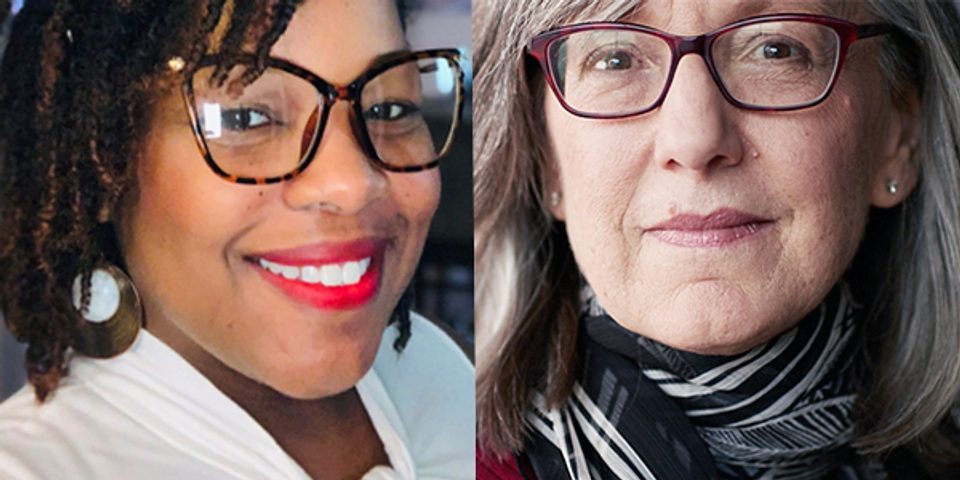Partnership brings heart health research where it’s needed: the community

Partnership brings heart health research where it’s needed: the community
Although she spends her days on research that is dedicated to improving maternal health outcomes, Dr. Janet Catov knows the best way to accomplish that goal is to bring what happens in the laboratory to the place where it will make the most impact — the community.
So a few years ago, after connecting with the Pittsburgh-based nonprofit Healthy Start Inc., Dr. Catov began working with Chief Executive Officer Jada Shirriel to identify opportunities for doing exactly that.
The result is Heart Health for New Moms, a new initiative that aims to lower preeclampsia and other heart-related disorders among women who carry a higher risk for these complications.
“My research is very interested in understanding the why: What causes these adverse pregnancy complications, and what are the mechanisms by which they are linked to accelerated progression to heart disease, for example, later in life,” explains Dr. Catov, an investigator with Magee-Womens Research Institute.
One focus of Dr. Catov’s research is preeclampsia, a pregnancy complication that, when combined with other risk factors, can result in chronic hypertension as soon as one year after delivery for more than half of the mothers who are diagnosed with it.
Black women experience higher rates of preeclampsia as well as higher rates of more severe cases and progression to complications, a key factor contributing to longstanding disparities in maternal health outcomes. By addressing risk factors in partnership with the Black community, Dr. Catov hopes the research will help more women stay healthy, thus reducing disparities.
Healthy Start serves about 700 families annually with direct services, and thousands with community education, according to Shirriel. That makes the organization an ideal partner for sharing information from research, but also for providing feedback to Dr. Catov’s group that better informs their work.
“I think women appreciated learning more about those conditions and how they can prevent or manage them, or even improve communication with their providers,” says Shirriel, who is a co-investigator on some of Dr. Catov’s projects. “We’ve gotten great feedback. We’ve gotten a lot of women who have been inspired to share their stories.”
Faith Otey, who had high blood pressure when she was pregnant with her son in 2019, has lost 15 pounds since his delivery and focuses on healthy eating for both herself and her two children.
“I’m a little bit of an introvert,” she says. “This has definitely enlightened my life and added value to it.”
A doula provided by Healthy Start checked on her regularly throughout the pregnancy, when she was exiting an abusive marriage, and even stayed with her when she gave birth.
“That’s the type of sisterhood that is necessary in the Black community,” Otey says. “They have been a blessing in my life.”
With funding from the Jewish Healthcare Foundation, MWRI and Healthy Start launched a pilot program that enrolled 122 women with preeclampsia or gestational hypertension who were randomized to one of three groups: one that was given information about heart health, which is the usual standard of care; a second group of women who were taught how to monitor their blood pressure at home each month for a year; and a third that gets home blood pressure monitoring as well as remote access to a lifestyle coach for a year after delivery.
When the COVID-19 pandemic hit, the partners pivoted to become 100 percent virtual. Healthy Start developed educational videos for social media, then documented how often each was accessed.
“We really found opportunities to build on the strength of the partnership and make the changes that were needed to continue to do the work, despite the environment,” Shirriel says. “There’s continued opportunity for growth.”
The next phase of the partnership will focus on launching a pilot program offering postpartum doula services to mothers with preeclampsia or gestational hypertension. MWRI will train doulas about the importance of heart health, stress reduction, and blood pressure monitoring.
Dr. Catov says she has learned a great deal by working directly with community partners, helping to shape her research while also bringing the knowledge generated by science into the community.
“That has grown my view of the research we do,” she says. “It’s a win-win-win.”
Be the First to Know
Get the latest research, news, events, and more delivered to your inbox.